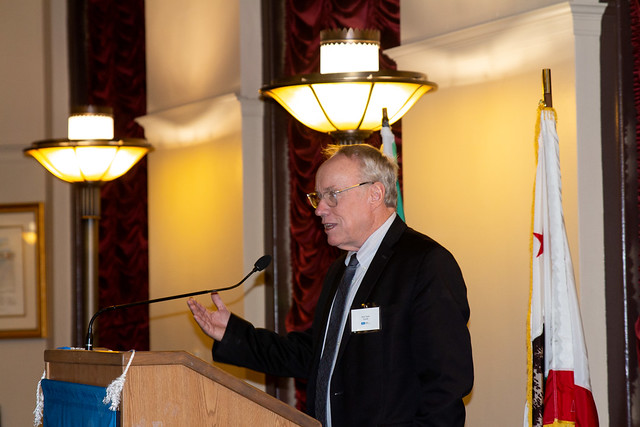By Mary Braswell
Two UCLA Luskin master’s students are putting their public policy education into action to advocate for equal opportunities for undocumented students — and their work is already paying off.
Last fall, Carlos Alarcon and Karely Amaya spearheaded a campaign known as Opportunity for All, which called on the University of California to remove hiring restrictions for all students, regardless of immigration status.
Backed by labor, legal and education experts across the nation, the campaign laid out a strategy that upended prevailing interpretations of a 1986 federal law that had blocked employment opportunities for undocumented immigrants.
In May, hundreds of students from up and down California carpooled to UCLA to show their support at a rally during a meeting of the UC Regents. During a public comment period the following day, speakers donned Opportunity for All T-shirts to stand in solidarity.
“Just to see the sea of blue — it was beautiful,” said Amaya, who delivered an impassioned statement to the regents that day, along with Alarcon and other advocates.
At the close of the session, the board voted unanimously to find a pathway to enact the groundbreaking policy. It established a working group that set out to tackle the legal and political ramifications within six months.
“Absolutely, it is our intention to find a way to allow employment opportunities for all our students, regardless of their immigration status,” Regent John A. Pérez said after the meeting. “This is too important to get wrong.”
‘This could set a huge precedent for what happens next.’ — Student leader Karely Amaya
Alarcon and Amaya credited the vast array of forces that came together to create a campaign that ended in “yes.” The UCLA Labor Center and UCLA Law were key allies that provided expertise and resources, and endorsed the strategy of letting undocumented students’ voices lead the way.
“The beauty of our campaign was that we weren’t looking at this just through the lens of student organizing. We weren’t looking at it just through a lens of the law and immigration and labor law,” Alarcon said. “We were also looking at it through the lens of politics,” aware that the window of opportunity to act on immigrant rights would be impacted by the 2024 U.S. presidential contest.
Lessons learned in their public policy coursework helped shape the campaign, the students said.
“This showcases the incredible policy work our students are engaging in outside of the classroom,” said Kevin Franco, director of student affairs for UCLA Luskin Public Policy. “The work that Carlos and Karely are doing is crucial.”
The student leaders, each of whom came to the United States as young children, had been speaking out on behalf of the undocumented population for years. Their paths first crossed when they were undergraduates, Alarcon at UC Riverside and Amaya at UCLA.
Both were part of the 2021 Dream Summer fellowship program, hosted by the UCLA Labor Center’s Dream Resource Center to empower immigrant youth to address the needs of their community. And both were accepted into the Master of Public Policy program at UCLA Luskin, Amaya in her first year and Alarcon preparing to graduate this week.
At UCLA, they launched the Undocumented Student-Led Network, uniting peers from across the UC campuses, and settled on their top priority: allowing students to work so that they could sustain themselves, pay tuition and continue their education.
“Our message was, ‘Hey, we’re your students. You accepted us into this prestigious university. You put us on your brochures. But I don’t have the same opportunities as my classmates,’” Amaya said.
As a participant in the Deferred Action for Childhood Arrivals program, Alarcon is eligible for a work permit. But Amaya is one of tens of thousands of California students who were shut out of DACA after it was halted during the Trump administration and remains tied up in the courts. As a result, she said, she was unable to accept an offer to work as a graduate student researcher, which would have fully covered her tuition.
The Undocumented Student-Led Network set out to address that inequity, and quickly learned that UCLA Law was already on the case. Its Center for Immigration Law and Policy had developed a novel legal theory arguing that individual states are not bound by the decades-old federal law barring the hiring of undocumented residents.
Twenty-nine respected immigration and constitutional law professors from universities around the country signed a letter endorsing the legal analysis, a pivotal part of the campaign’s multi-pronged approach.
“We realized that it’s going to take a whole strategy, an implementation plan,” Amaya said. “We’re going to organize undocumented students. We’re going to build power. We’re going to continue reaching out to the media to report on this, and we’re going to meet with state legislators, nonprofits, different actors. We need all of our allies to show up for this.”
Their efforts paid off. The October launch of the campaign was accompanied by a New York Times piece laying out the issues. A nonprofit donated $30,000, allowing the team to purchase shirts, banners and other campaign materials aimed at underscoring their message and building community. Momentum grew, leading to the UC Regents’ action on May 18, which made headlines across the country.
The vote means the students’ work will continue. Representatives from the Undocumented Student-Led Network and other student organizations plan to meet regularly with the regents’ working group. And Alarcon and Amaya have high hopes that California will be a model for action that eventually opens the door of opportunity for students beyond its borders.
“This could set a huge precedent for what happens next,” said Amaya.



